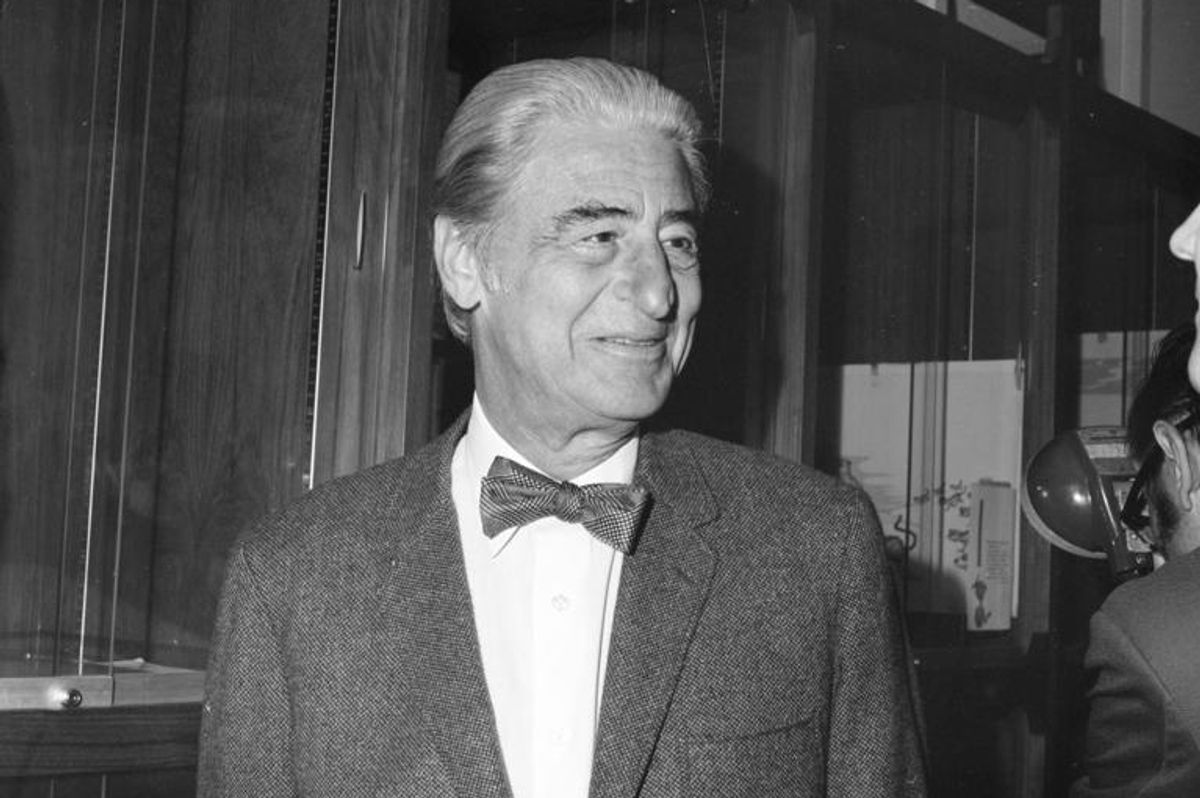Dr. Seuss might be known for his children's books, but his political cartoons were next-level
The well known author wrote more than 400 clever and poignant cartoons during World War II.
This photo was taken of Theodor Seuss Geisel at the UC San Diego Library.
Did you know that in addition to being a beloved author of children's books, Dr. Seuss wrote more than 400 political cartoons during World War II?
Theodor Seuss Geisel, better known as Dr. Seuss, gifted the world with stories like "The Cat in the Hat," "The Lorax," "Green Eggs and Ham," and dozens of other childhood classics until his death in 1991.
In recent years, however, it's some of his lesser known works from the 1940s that have gained attention.As World War II was slowly moving toward a reality, Seuss began penning cartoons for PM, a liberal publication, frequently pushing back against the "America First" mentality of U.S. isolationists opposed to U.S. involvement in the war.
So when Donald Trump adopted "Make America Great Again" as his campaign slogan, echoing cries of "America First" — the rallying call for an anti-Semitic and Nazi-appeasing segment of the wartime U.S. population — some of Seuss' cartoons began to find new relevance more than 70 years after first being published.
Like this one, which depicts a mother reading a book titled "Adolf the Wolf" to children while wearing an "America First" shirt, explaining that because the wolf's victims were foreign children, it didn't really matter that the wolf ate them — a clear parallel to the conflicting approaches to our modern refugee crisis.

A Dr. Seuss political cartoon sharing thoughts on isolationism.
Image dated Oct. 1, 1941, via Dr. Seuss Political Cartoons/Special Collection and Archives, UC San Diego Library
"And the Wolf chewed up the children and spit out their bones ... but those were Foreign Children and it really didn't matter."

Cartoon about WWII and Hitler dragging Russia into the war.
Image dated June 25, 1941, via Dr. Seuss Political Cartoons/Special Collection and Archives, UC San Diego Library.
"A. Hitler taxidermist"

Dr. Seuss uses clams in talking about Hitler in a political cartoon from 1941.
Image dated July 17, 1941, via Dr. Seuss Political Cartoons/Special Collection and Archives, UC San Diego Library.
"We Clams Can't Be Too Careful."

A political satire created by Dr. Seuss on the impending World War II.
Image dated May 27, 1941, via Dr. Seuss Political Cartoons/Special Collection and Archives, UC San Diego Library.
"The old Family bath tub is plenty safe for me!"
Suess's other comics took aim at overarching issues like anti-Semitism, racial inequality, and political obstructionism — all issues still relevant today.
To be sure, the comics were far from perfect and reflected some ugly stereotypes of their own. For instance, many of his cartoons amplified some pretty awful impressions of Japanese citizens and Japanese-Americans. And while it's easy to chalk that up as being simply an element of the time, that type of anti-Japanese sentiment helped fuel the racism and paranoia that eventually led to Japanese internment.

A Dr. Seuss cartoon depicts Hitler singing.
Image dated July 20, 1942, via Dr. Seuss Political Cartoons/Special Collection and Archives, UC San Diego Library.
"Only God can make a tree to furnish sport for you and me!"

An elephant tries to stop a tank in a political cartoon.
Image dated Oct. 24, 1941, via Dr. Seuss Political Cartoons/Special Collection and Archives, UC San Diego Library.
"Stop all U.S. progress."

Political cartoon uses 'Pledge of Allegiance' to make a point.
Image dated July 30, 1942, via Dr. Seuss Political Cartoons/Special Collection and Archives, UC San Diego Library.
"The Guy Who Makes a Mock of Democracy."

Political cartoon suggests the war is coming to America.
Image dated Sept. 9, 1941, via Dr. Seuss Political Cartoons/Special Collection and Archives, UC San Diego Library.
"Relax, Sam, I assure you the express turns off right here!"
If the world of Dr. Seuss can teach us anything, it's that history is our best defense against modern tyranny.
Well, that, and the fact that Americans will always love goofy hats:

Political cartoon suggests burying your head in the sand.
Image dated April 29, 1941, via Dr. Seuss Political Cartoons/Special Collection and Archives, UC San Diego Library.
"We Always Were Suckers for Ridiculous Hats."
See more of Seuss' wartime comics at the University of California San Diego Library's website.This story originally appeared on 03.02.17
- People had lots of thoughts and concerns about the Dr. Seuss story. Let's discuss the best ones. ›
- Man skillfully raps Dr. Seuss rhymes over Dr. Dre beats in a must-see mashup ›
- Dr. Seuss estate says it will stop publishing 6 books with 'hurtful and wrong' depictions - Upworthy ›
- Man gains huge TikTok following by rapping Dr. Seuss books - Upworthy ›
- Mom swaps out her toddler's modern cartoons for 90s classics and the results were fascinating - Upworthy ›
- Man skillfully raps Dr. Seuss rhymes over Dr. Dre beats - Upworthy ›

